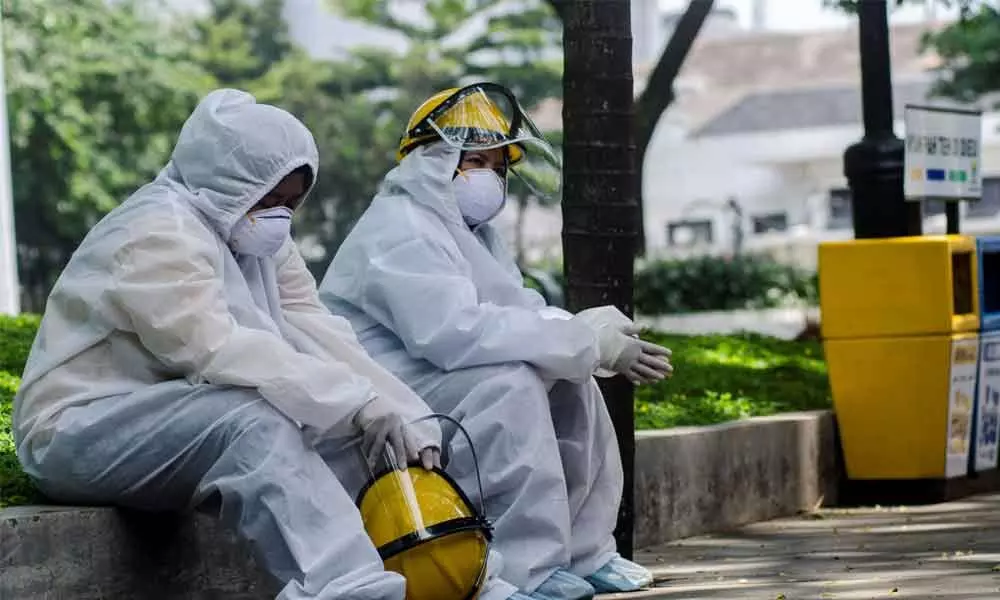Rebounding from corona, the Chinese way

Subway travel is up by 21 percent and domestic airline traffic is up by three percent in the last few days in China. Factories such as of carmakers have started production again. Today China is supplying medical equipment to large numbers of countries from its factories. No wonder, the United Nations Conference on Trade and Development (UNCTAD) has said that China will escape the looming recession of the world economy and India might just do so. Why has it singled out China and India? UNCTAD has unfortunately not disclosed the reasons behind making this assessment. Therefore, I made some study. There appear to be four reasons for this prognosis.
First reason appears to be that the number of elderly persons who are prone to infections is less in our countries. Persons above 65 years age constitute merely 6 percent of the population in India and 11 percent in China against 15 to 23 percent in France, Italy, Spain, the United Kingdom (UK) and the United States of America (US). Second reason appears to be that China, India and the US have less dependence on global trade. This means that the lockdowns in other countries will have less impact on these countries. For example, a village will get affected by lockdown in the city if it is dependent on the supply of chemical fertilizers from there. It would remain unscathed if it were making its own farmyard manure. Third reason appears to be that China, India and the US are large countries. They can make most, if not all, types the goods themselves. Fourth reason appears to be that the domestic savings rate of China and India is higher than the other five. China's savings rate is 47 percent, India's is 30 percent while that of the other five countries is between 15 and 22 percent. The high savings rate means that our households have adequate financial backup for emergencies. For example, the US citizens have been long encouraged to take loans and buy consumption goods. It appears that China and India will be able withstand the corona crisis better for these reasons. The situation of the US needs discussion. It has less dependence on foreign trade and it also is a large country it is yet prone to crisis because the burden of age is high, and savings rate is low.
The lesson for us is that we must maintain our low dependence on foreign trade. Know that China is not dependent on imports. Its economy, if at all, is dependent on exports. But the export-dependence can be easily overcome by developing domestic markets. We, on the other hand, have foolishly encouraged imports and squandered our economic sovereignty. We must retrace our steps and embrace import-substitution. Secondly, we must try to increase our domestic savings rate instead of depending on foreign investment. We should create demand in the market by savings-led-investment instead of foreign borrowings-led-consumption.
We also need to understand why UNCTAD says that China will most certainly rebound. Three Chinese doctors have explained the steps taken by that country. The first step taken by them was to make available the kits for testing of corona in sufficient numbers within three weeks. This made it possible to correctly identify and track the infected persons. Second, adequate amounts of protective equipment such as specialised masks and sanitisers were made available. Third, lockdown was done in other non-affected States early so that the entry of the virus from Wuhan could be prevented. Fourth, China allowed certain commercial establishments to reopen. However every worker in these establishments was given a QR code and was required to report his health condition every day. That made it possible to track all persons who had been allowed to move during the lockdown. This tracking reduced the chances of the virus spreading. The permission for an industrial establishment to remain open was given if this direction was followed diligently. Lastly, the government informed the people every day of the status of the infections which brought forth cooperation from the people and prevented rumours.
We must implement these steps. First, the government must ask the businesses to manufacture testing kits and protective gear and make them available not only to our health workers but also to export to other needy countries. Second, the government must create artificial borders around each State. The government will face a dilemma on April 15th. The virus may spread if the lockdown is ended; while the people will go hungry if the lockdown is continued. The solution is to make an assessment of the spread of the virus in each State and allow those States to reopen where tracking is good and infections are less. Lockdown must be continued in States like Maharashtra that have not been able to prevent people loitering on the streets. The entry into and exit from such States must be permitted only after rigorous testing. This will make it possible for economic activity in certain States to rebound. The third requirement is to test and track the infected. The Union and the State governments must require all their employees in non-essential services like education, PWD and judiciary to report to the nearest Primary Health Centre immediately. These employees must be assigned to particular streets in the cities and to particular villages in the rural areas and required to test and track the infected. We have about two crore government servants of which, say, one crore can be deployed in this work. We have about 30 crore households. This means one government servant will be required to monitor a mere 30 households. They can easily visit these 30 households every day. Fourth, the government must make an official briefing every evening giving the correct status of corona crisis to the people followed by State-wise briefings. Lastly, the Union government must arrange to distribute food to the needy every day. If necessary, the salaries and pensions of government servants may be cut by 50 percent to make available monies for this task. It is a grand anomaly that the served are dying while the servants are enjoying full pay sitting at home. These steps will make it possible for us to avoid economic recession in the times of corona the possibility of which has been mentioned by UNCTAD.
.(The writer is formerly Professor of Economics at IIM, Bengaluru)















